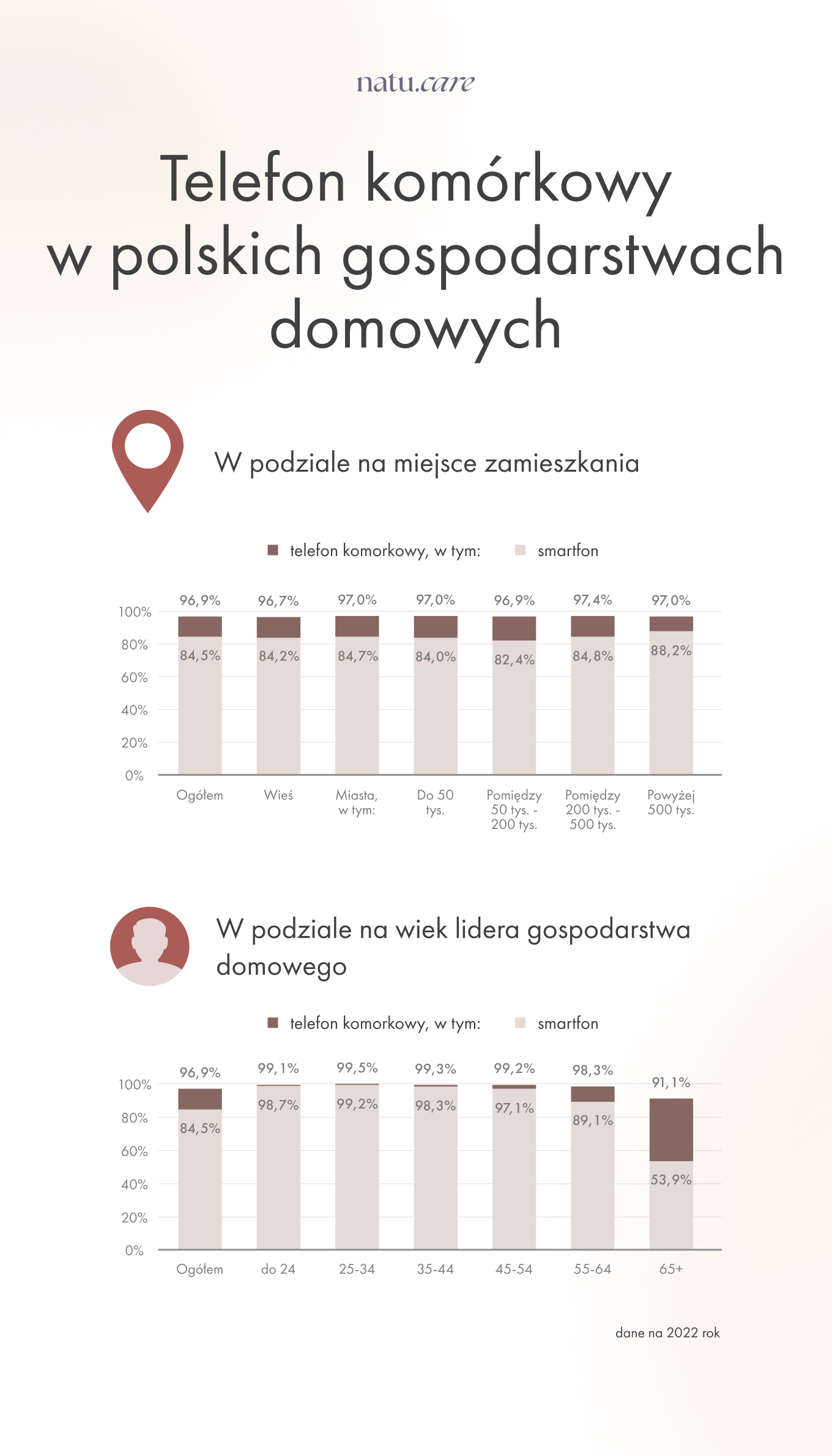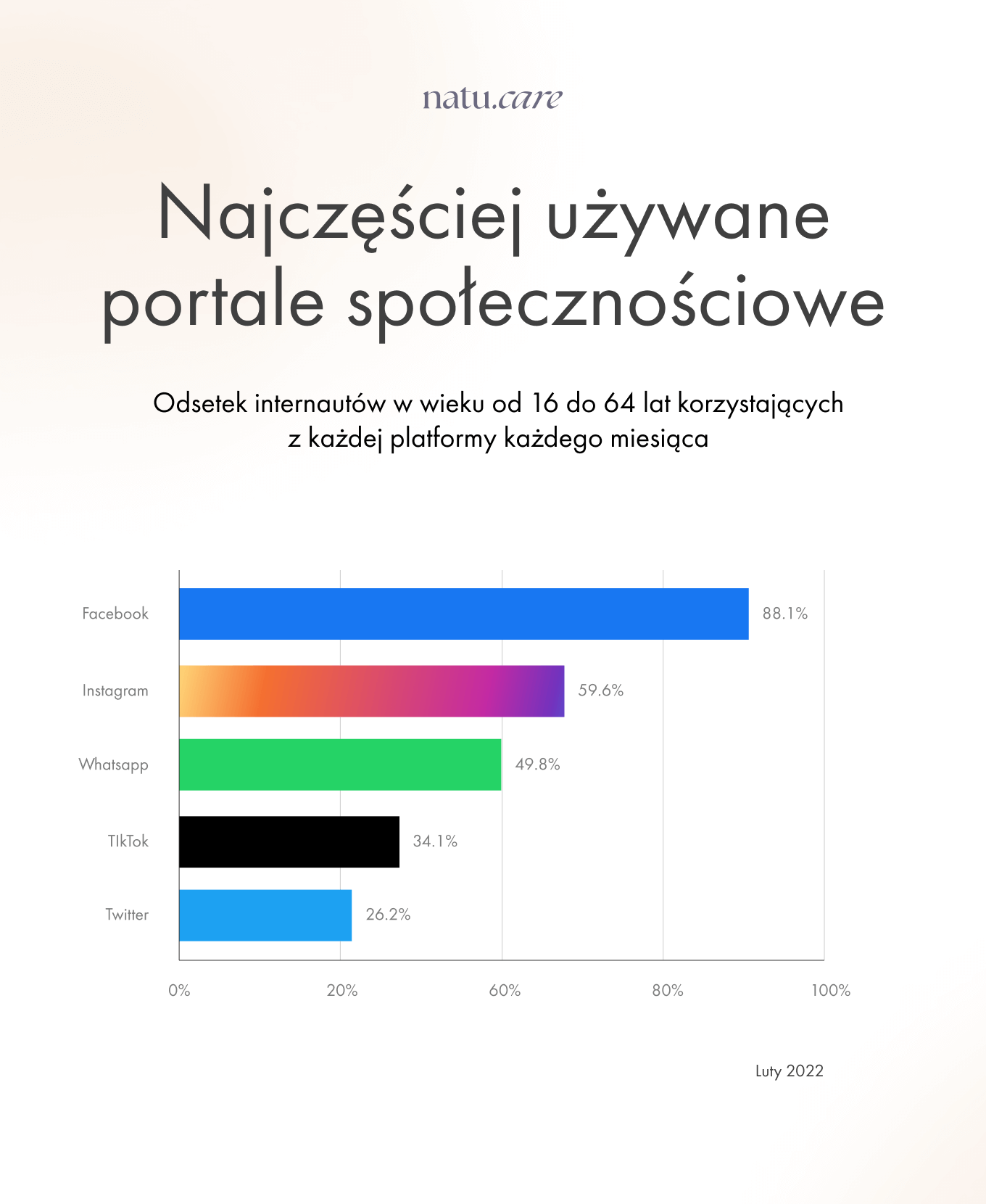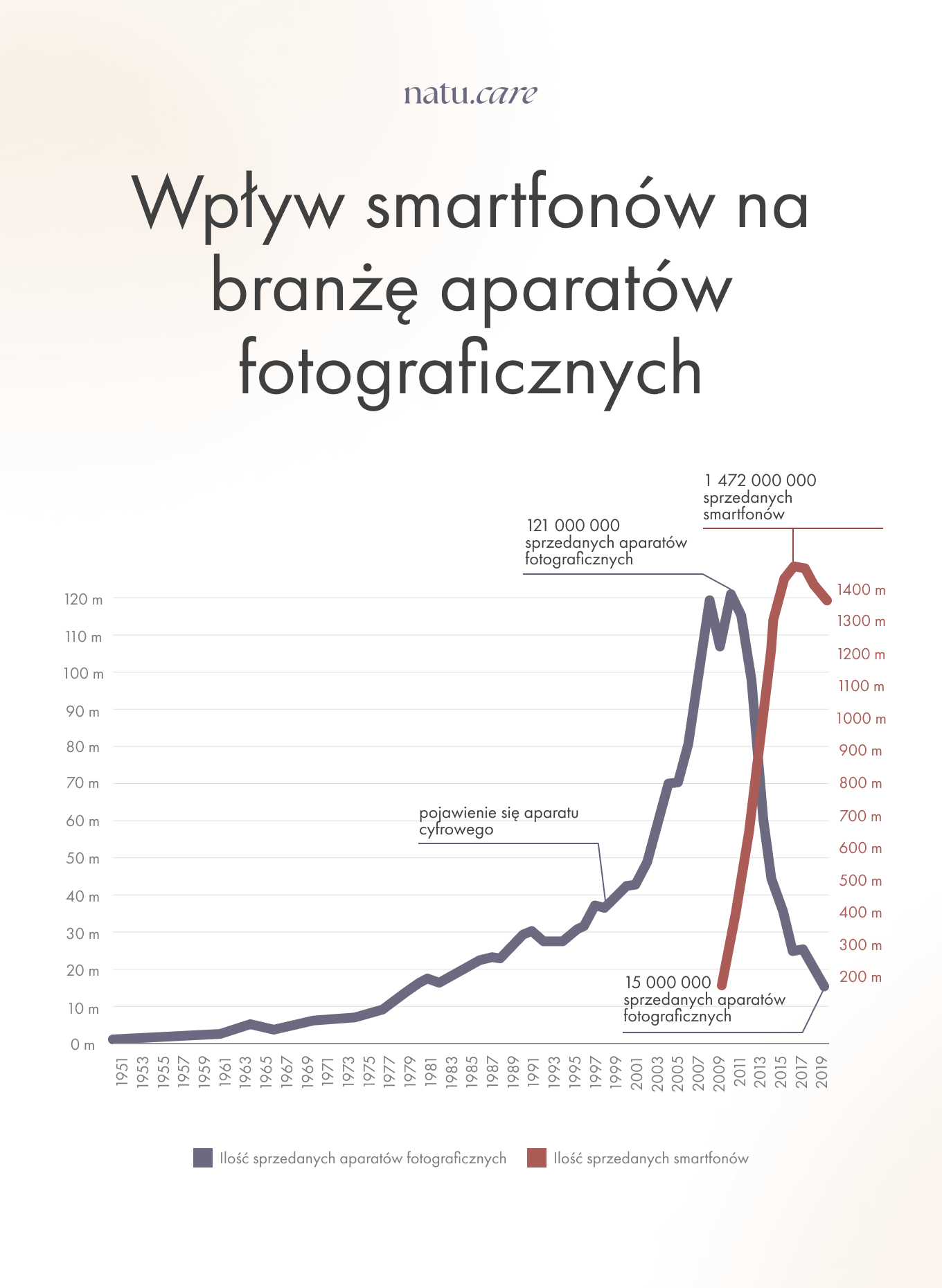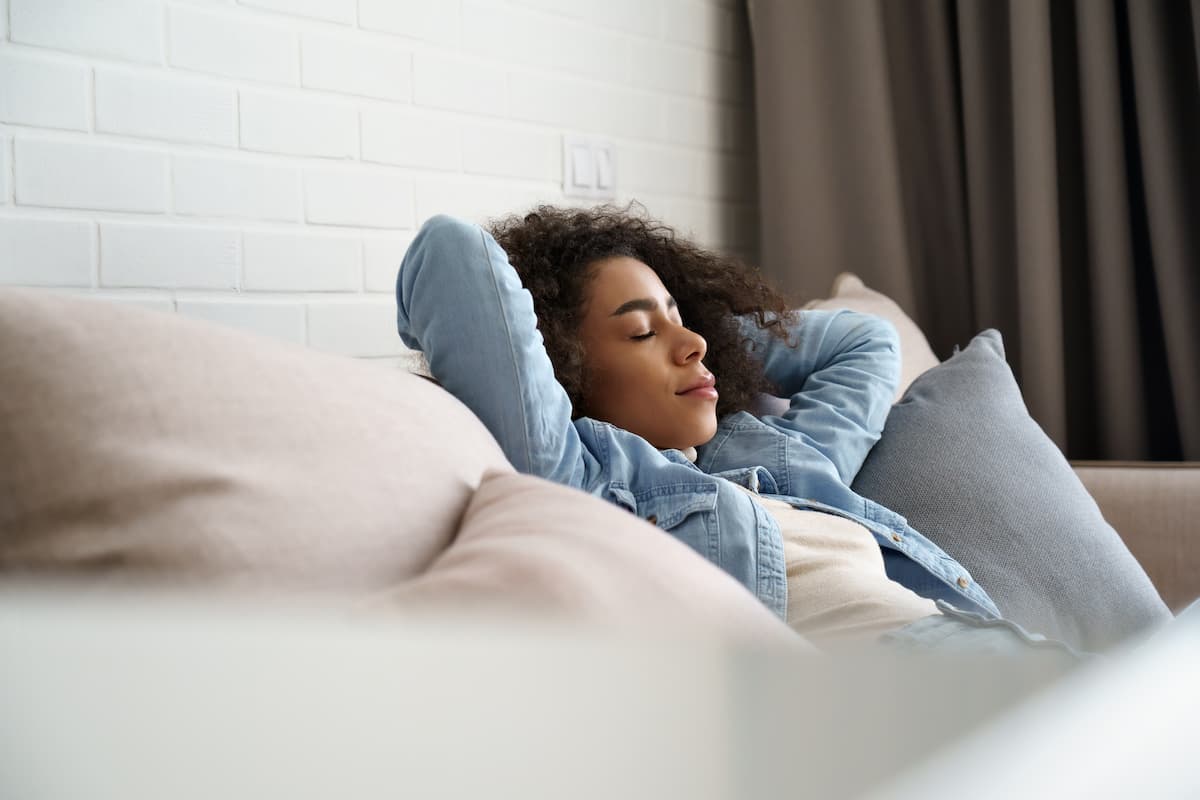World No Mobile Phone Day 2025 - are you celebrating?
We check the smartphone habits of Poles to mark World No Phone Day.


Learn more about our editorial process
.

Learn more about our editorial process
.

Learn more about our editorial process
.

Learn more about our editorial process
.
Why you can trust us
Articles on Natu.Care are written based on scientific research, data from government websites and other reliable sources. The texts are written in cooperation with doctors, nutritionists and other health and beauty experts. Articles are reviewed before publication and during significant updates.
.Learn more about our editorial process
.Information about advertisements
Content on Natu.Care may contain links to products from the sale of which we may receive a commission. When creating content, we adhere to high editorial standards and take care to be objective about the products discussed. The presence of affiliate links is not dictated by our partners, and we select the products we review ourselves completely independently.
.Learn more about our terms and Conditions
.Try to survive 24 hours without a mobile phone, aka World No Phone Day. Can you do it?"
Cellphone - pure evil, a necessary evil or perhaps a useful tool for work and everyday life? Smartphones can be looked at from different perspectives. One thing is indisputable - most of us cannot imagine life without them.
How do we know this?
How do we know this? In the Natu.Care team, we have tested it on our own skin. Find out below if it hurt a lot.
From this article you will learn:
- What are the statistics of phone and social media use.
- What are the statistics of phone and social media use?
- We can do without smartphones.
- We can do without smartphones.
- What are the symptoms of phone addiction.
- What are the symptoms of phone addiction?
- How smartphones affect our health. .
- How to find phone-life balance. .
See our other social campaigns:
.
- Before Kindergarten Day: no phone or tablet
- Great Bee Day
- World Food Day
- Do you know the rules of sleep hygiene?
- How to take care of your mental health?
- About singles on Valentine's Day
- More than 20 questions about blood donation
- How to donate bone marrow
- Cervical cancer .
When is a day without a phone?
.
World No Mobile Phone Day is celebrated on the 15th of July. And contrary to appearances, it was not invented by psychologists or doctors, but by... internet users. The idea to refrain from using a mobile phone for 24 hours went viral on the web.
Because of its informal nature, it is difficult to state clearly since when it has been celebrated. It can be assumed that it became popular a dozen or so years ago.
The popularity of mobile phone use in Poland is a matter of fact.
How Poles use the phone - some statistics
.
Before finding out how we survive a day (or several) without our phones, let's take a peek at the statistics.
Before finding out how we survive a day (or several) without our phones, let's take a peek at the statistics.
According to the Digital report, there will be around 54 million active mobile phones in Poland in 2022. That's almost 143% of the population. Although it looks strange, the data is not necessarily wrong - many people use more than one mobile phone (e.g. private and business).
According to a study by the National Media Instituteand, a mobile phone will be on the equipment of almost 97% of households in 2022, and 84.5% of these devices will be smartphones.

Interestingly, according to statistics from the National Media Institute, more households own a phone than a TV.

According to a 2020 report by the National Debt Register 30% of Poles declared that they use their phone for 2-4 hours a day, and 14% admitted that the small screen absorbs them for even longer.

The Digital report (data from 2022) instead shows that the average time spent using the internet on a phone is 2 hours and 58 minutes.
Interesting fact
.According to a study organised by Wprost.pl, the most popular phone brand in Poland is Samsungand.
.
Social media
.
Who among us doesn't like to take a look at facebook or insta in our spare time? Digital estimated that in 2022, we spent 1 hour and 49 minutes per day on social media, and social networks had 27.2 million registered Polish users.
Invariably for years, Facebook has been the most popular. It is used by over 88% of internet users, with almost 37% indicating it as their favourite social networking platform. It is worth noting that almost 97% of hits on this platform in 2022 occurred from mobile phones.
Facebook is consistently catching up with Meta's second product, Instagram, which is already used by almost 60% of internet users.

Interesting facts
The world's most expensive phone is the Diamond Rose Iphone 4 32GB. The dizzying price of $8 million is influenced by 500 individual diamonds, set into the Apple logo, case edges and home button. Would you put a case on it?
The phone instead of...
.
If I had to answer the question of which piece of equipment has replaced my phone, I would answer without hesitation: the camera. Looking at the data presented by Statistic_Data_Facts, I am not the only one.
Since smartphones started to appear in our homes, we are buying far fewer traditional cameras. Over a 10-year period (2010-2019), sales of camera equipment decreased by 87.6%and.

Source: https://www.stadafa.com/2019/11/smartphone-impact-on-camera.html
According to Google Trends data, Blik, a method of quick payments made to a phone number, has also been growing in popularity since 2015. Blik can also be used to pay in-store or online.
The Blik payment method is also popular.
Another popular payment method is Google Pay or Apple Pay, which are already compatible with most banking apps. Thanks to them, the phone is slowly starting to replace the wallet as well.
The phone is also a popular payment method.
Do the manufacturers of these leather goods have anything to fear? Perhaps, especially since from 14 July 2023, the mCitizen app (an electronic version of your documents) will be treated on a par with traditional documents, confirming personal informationand.
Since we are already talking about the wallet, it is worth mentioning that the trend of online shopping is on the rise. According to CSO data , in 2022 there was a 3.4 percentage point increase in the percentage of people ordering goods and services online, compared to the previous year.
Point? Your phone isn't just social media - it's also your camera, wallet and document (as well as a map, notepad and a few others).
Premium Sodium Butyrate
Product description
Premium Sodium Butyrate is a natural support for your digestive system. With a high dose of butyric acid (940 mg), it supports the regeneration of the intestinal mucosa, improving gut health and function, and aids in the absorption of nutrients. By taking care of your intestines, you're taking care of the health of your entire body.
Studies involving people suffering from irritable bowel syndrome confirm that sodium butyrate is ideal for supporting issues related to bacterial flora imbalances (for example, after antibiotic therapy), constipation and diarrhea, inflammation of the intestinal mucosa, or a diet low in fiber.
Premium Sodium Butyrate capsules are made using the innovative DRcaps® technology. This guarantees that the active ingredients in the product are protected from the destructive effects of stomach acids and digestive enzymes. As a result, we can be sure that the beneficial ingredients are released in the small intestine and are fully absorbed by our body.
Premium Sodium Butyrate from Natu Care is 100% tested, and its composition contains only the highest quality raw materials.
Pros and cons
Pros:
- Supports digestive system function
- Helpful for various gastrointestinal conditions, including IBS
- High dose of butyric acid in each capsule
- Eco-friendly, clean, and tested composition
- Free from added sugar, gluten, GMOs, and lactose
- Innovative capsule technology - DRcaps
Cons:
- None
Additional Information
Take 3 capsules daily at any time of the day, preferably with a meal. Swallow the capsules whole with water.
Premium Sodium Butyrate is intended for adults.
The product should be used under medical supervision.
User review
I've been using the product for 2 weeks. My stomach feels lighter, and my digestion has improved. I recommend it.
Product description
The dietary supplement contains omega-3ᵀᴳ, or omega-3 acids in the form of trójglyceridesów. Scientific studies suggest that this form of fatty acidsós up to 2 times better absorbed than the estersós present in many dietary supplements on the market. This means that you are assured of their effectiveness and of supplying yourself with valuable omega acids.
Fatty acids omega-3 are derived from wild anchovy oil. It is a rich source of healthy fats that are essential for the health of the cardiovascular, immune and nervous systems, as well as the proper function of vision, joints muscles.
Scientific research suggests that wild anchovies are a good source of healthy fats.
Scientific research also suggests that an adequate intake of omega-3 fatty acidsós protects against and supports the treatment of depression and anxiety disorders. In addition, omega-3s influence the hydration and appearance of the skinóry and support healthy sleep.
.
The formula contains a total of 750 mg of EPA+DHA acidsós, which is three times higher than the recommended minimum of 250 mg for the Polish population. Omega-3 TG Premium has studies indicating that its TOTOX is 9, which is a very good result.
Supplementation of omega-3 fatty acidsóis recommended for anyone who does not eat 1–2 portions (approximately 300 g) of oily fish per week. Children during growth, seniors, physically active people, vegans and vegetarians, as well as patients undergoing cardiovascular treatment and prevention of heart disease also have an increased need.
Pros and cons
The dietary supplement contains omega-3ᵀᴳ, or omega-3 acids in the form of trójglyceridesów. Scientific studies suggest that this form of fatty acidsós up to 2 times better absorbed than the estersós present in many dietary supplements on the market. This means that you are assured of their effectiveness and of supplying yourself with valuable omega acids.
Fatty acids omega-3 are derived from wild anchovy oil. It is a rich source of healthy fats that are essential for the health of the cardiovascular, immune and nervous systems, as well as the proper function of vision, joints muscles.
Scientific research suggests that wild anchovies are a good source of healthy fats.
Scientific research also suggests that an adequate intake of omega-3 fatty acidsós protects against and supports the treatment of depression and anxiety disorders. In addition, omega-3s influence the hydration and appearance of the skinóry and support healthy sleep.
.
The formula contains a total of 750 mg of EPA+DHA acidsós, which is three times higher than the recommended minimum of 250 mg for the Polish population. Omega-3 TG Premium has studies indicating that its TOTOX is 9, which is a very good result.
Supplementation of omega-3 fatty acidsóis recommended for anyone who does not eat 1–2 portions (approximately 300 g) of oily fish per week. Children during growth, seniors, physically active people, vegans and vegetarians, as well as patients undergoing cardiovascular treatment and prevention of heart disease also have an increased need.
Additional information
The dietary supplement contains omega-3ᵀᴳ, or omega-3 acids in the form of trójglyceridesów. Scientific studies suggest that this form of fatty acidsós up to 2 times better absorbed than the estersós present in many dietary supplements on the market. This means that you are assured of their effectiveness and of supplying yourself with valuable omega acids.
Fatty acids omega-3 are derived from wild anchovy oil. It is a rich source of healthy fats that are essential for the health of the cardiovascular, immune and nervous systems, as well as the proper function of vision, joints muscles.
Scientific research suggests that wild anchovies are a good source of healthy fats.
Scientific research also suggests that an adequate intake of omega-3 fatty acidsós protects against and supports the treatment of depression and anxiety disorders. In addition, omega-3s influence the hydration and appearance of the skinóry and support healthy sleep.
.
The formula contains a total of 750 mg of EPA+DHA acidsós, which is three times higher than the recommended minimum of 250 mg for the Polish population. Omega-3 TG Premium has studies indicating that its TOTOX is 9, which is a very good result.
Supplementation of omega-3 fatty acidsóis recommended for anyone who does not eat 1–2 portions (approximately 300 g) of oily fish per week. Children during growth, seniors, physically active people, vegans and vegetarians, as well as patients undergoing cardiovascular treatment and prevention of heart disease also have an increased need.
Expert opinion
The dietary supplement contains omega-3ᵀᴳ, or omega-3 acids in the form of trójglyceridesów. Scientific studies suggest that this form of fatty acidsós up to 2 times better absorbed than the estersós present in many dietary supplements on the market. This means that you are assured of their effectiveness and of supplying yourself with valuable omega acids.
Fatty acids omega-3 are derived from wild anchovy oil. It is a rich source of healthy fats that are essential for the health of the cardiovascular, immune and nervous systems, as well as the proper function of vision, joints muscles.
Scientific research suggests that wild anchovies are a good source of healthy fats.
Scientific research also suggests that an adequate intake of omega-3 fatty acidsós protects against and supports the treatment of depression and anxiety disorders. In addition, omega-3s influence the hydration and appearance of the skinóry and support healthy sleep.
.
The formula contains a total of 750 mg of EPA+DHA acidsós, which is three times higher than the recommended minimum of 250 mg for the Polish population. Omega-3 TG Premium has studies indicating that its TOTOX is 9, which is a very good result.
Supplementation of omega-3 fatty acidsóis recommended for anyone who does not eat 1–2 portions (approximately 300 g) of oily fish per week. Children during growth, seniors, physically active people, vegans and vegetarians, as well as patients undergoing cardiovascular treatment and prevention of heart disease also have an increased need.
Natu.Care Premium Magnesium + Vitamin B6

- Magnesium content per day: 305 mg
- Additional active ingredients: Vitamin B6 (2.1 mg)
- Form: capsules
- Serving size: 3 capsules per day
- Sufficient for: 30 days
Product description
The Premium Magnesium + Vitamin B6 dietary supplement is a comprehensive product that combines three organic forms of magnesium (citrate, malate, and diglycinate) and vitamin B6 in highly absorbable forms.
Magnesium is an essential mineral without which our bodies cannot function properly. It supports the immune, nervous, and muscular systems, maintains electrolyte balance, and is involved in cell division and the regulation of mental functions.
Research shows that magnesium supplementation is even more effective when accompanied by vitamin B6, which is included in our product. Vitamin B6 is responsible for the proper functioning of the nervous and immune systems, as well as the proper functioning of the heart.
If you want to safely get rid of feelings of fatigue, concentration problems, hair loss, muscle cramps, trembling, or irritability, reach for Premium Magnesium from Natu.Care, tested by the independent, certified laboratory J.S. Hamilton Poland.
Pros and cons
Pros
- Supports the proper functioning of the nervous and immune systems.
- Reduces feelings of fatigue and tiredness.
- Maintains proper psychological functions.
- The purity of the ingredients (free from anti-caking agents, artificial fillers, and additives such as titanium dioxide, microcrystalline cellulose, talc, magnesium stearate, and silicon dioxide) has been confirmed by laboratory tests.
- High absorption of ingredients.
- Soft capsules that are easy to swallow.
- Suitable for vegetarians and vegans.
Cons
- None.
Additional information
Take with a meal, 3 capsules per day.
The capsules should be taken with at least 250 ml of water.
If you have trouble sleeping, it is advisable to take 1 capsule in the morning and 2 capsules in the evening, no later than 4 hours before bedtime.
Avoid combining with products high in calcium (milk, yogurt, cheese), as this may negatively affect magnesium absorption.
Pregnant and breastfeeding women should consult a doctor before starting supplementation.
User review
I’m very impressed with the speed of delivery. The product itself is of high quality and absorbs well. After two weeks of supplementation, I’ve noticed a significant improvement in muscle recovery, especially during periods of intense training. I highly recommend it!
Natu.Care Vitamin D 2000 UI
Product description
Vitamin D plays a crucial role in our health and well-being. It affects calcium and phosphate metabolism, which translates to healthy bones and teeth. It also helps regulate the immune system, and studies indicate its influence on the functioning of the nervous system.
Vitamin D, although called a “vitamin,” is actually a prohormone that our body produces on its own, primarily under the influence of sunlight. Unfortunately, our modern lifestyle contributes to deficiencies of this essential vitamin. Working in enclosed office buildings, using (necessary!) SPF creams, and covering the body with clothing all make it very difficult, if not impossible, to obtain adequate levels of vitamin D from sunlight. This is why appropriate, year-round supplementation is so crucial.
Vitamin D from Natu.Care is a well-tested vitamin D3 suspended in safflower oil, a plant known for its numerous health benefits. The convenient, easy-to-swallow capsule will make supplementation a part of your daily, healthy routine, improving your overall well-being.
Pros and cons
Pros:
- Ensures proper functioning of the immune system
- Supports the maintenance of healthy bones and teeth
- Maintains proper heart, kidney, and muscle function
- Tested by an independent, certified laboratory
- Convenient and easy-to-swallow capsule
- Clean composition - free from added sugar, gluten, GMOs, lactose, and without preservatives or colorants
Cons:
- None.
Additional Information
Pregnant women and breastfeeding mothers should consult a doctor before using the product. This dietary supplement is intended for a healthy adult population up to the age of 75.
Product description
The dietary supplement contains high-quality fatty acids omega-3 from anchovy oil. It is a naturally rich source of healthy fats that are essential for cardiovascular, immune and nervous system health, as well as proper function of eyesight, joints muscles.
Scientific research also suggests that an adequate intake of omega-3 fatty acidsós protects against and supports the treatment of depression and anxiety disorders. In addition, omega-3s influence the hydration and appearance of the skinóry and support healthy sleep.
.
The dietary supplement contains 550 mg EPA+DHA per daily serving. This is more than double the official recommendations for the Polish population, whichóre suggesting an intake of at least 250 mg per day.
Supplementation of EPA+DHA is a good way to support healthy sleep.
Supplementation with omega-3 fatty acidsós is advisable if you do not consume 1–2 portions (approx. 300 g) of oily fish per week. There is also an increased need for physically active people, vegans and vegetarians, seniors, children during growth spurts and patients undergoing cardiovascular treatment and prevention of heart disease.
Pros and cons
The dietary supplement contains high-quality fatty acids omega-3 from anchovy oil. It is a naturally rich source of healthy fats that are essential for cardiovascular, immune and nervous system health, as well as proper function of eyesight, joints muscles.
Scientific research also suggests that an adequate intake of omega-3 fatty acidsós protects against and supports the treatment of depression and anxiety disorders. In addition, omega-3s influence the hydration and appearance of the skinóry and support healthy sleep.
.
The dietary supplement contains 550 mg EPA+DHA per daily serving. This is more than double the official recommendations for the Polish population, whichóre suggesting an intake of at least 250 mg per day.
Supplementation of EPA+DHA is a good way to support healthy sleep.
Supplementation with omega-3 fatty acidsós is advisable if you do not consume 1–2 portions (approx. 300 g) of oily fish per week. There is also an increased need for physically active people, vegans and vegetarians, seniors, children during growth spurts and patients undergoing cardiovascular treatment and prevention of heart disease.
Additional information
The dietary supplement contains high-quality fatty acids omega-3 from anchovy oil. It is a naturally rich source of healthy fats that are essential for cardiovascular, immune and nervous system health, as well as proper function of eyesight, joints muscles.
Scientific research also suggests that an adequate intake of omega-3 fatty acidsós protects against and supports the treatment of depression and anxiety disorders. In addition, omega-3s influence the hydration and appearance of the skinóry and support healthy sleep.
.
The dietary supplement contains 550 mg EPA+DHA per daily serving. This is more than double the official recommendations for the Polish population, whichóre suggesting an intake of at least 250 mg per day.
Supplementation of EPA+DHA is a good way to support healthy sleep.
Supplementation with omega-3 fatty acidsós is advisable if you do not consume 1–2 portions (approx. 300 g) of oily fish per week. There is also an increased need for physically active people, vegans and vegetarians, seniors, children during growth spurts and patients undergoing cardiovascular treatment and prevention of heart disease.
Expert opinion
The dietary supplement contains high-quality fatty acids omega-3 from anchovy oil. It is a naturally rich source of healthy fats that are essential for cardiovascular, immune and nervous system health, as well as proper function of eyesight, joints muscles.
Scientific research also suggests that an adequate intake of omega-3 fatty acidsós protects against and supports the treatment of depression and anxiety disorders. In addition, omega-3s influence the hydration and appearance of the skinóry and support healthy sleep.
.
The dietary supplement contains 550 mg EPA+DHA per daily serving. This is more than double the official recommendations for the Polish population, whichóre suggesting an intake of at least 250 mg per day.
Supplementation of EPA+DHA is a good way to support healthy sleep.
Supplementation with omega-3 fatty acidsós is advisable if you do not consume 1–2 portions (approx. 300 g) of oily fish per week. There is also an increased need for physically active people, vegans and vegetarians, seniors, children during growth spurts and patients undergoing cardiovascular treatment and prevention of heart disease.
Our little experiment
.
The above statistics clearly indicate that Poles like to sit on their phone. And we in the editorial team at Natu.Care are no exception at all. But we would be poorly placed to write about No Phone Day without treating ourselves to such an experience.
Number of daredevils who have decided to spend 24 hours or more without a phone: 7.
Most of us guinea pigs normally use the phone for 2-3 hours per day.
We rated at 3 (on a five-point scale) whether we think we are addicted to the phone. Despite this, five of us say the decision to take on the challenge was an easy one.
Impressions
.
As you can easily guess, we were practically unanimous in saying that we gained more free time by weaning ourselves off the phone. And we spent it mostly with loved ones (bravo us). The problem came at a time when there was basically nothing to do.
You have that unproductive half hour between one activity and another. Well, ideally, to pop on Instagram. Or send your friends a funny meme. Some were also afraid they would miss social events.
"Me and my friends often make last-minute plans. The decision to meet up is made on the same day, so I was worried that if they organised something - I would miss it because we had no way to contact each other", notes Lauren.
However, a major part of the annoyance of not having a phone was not boredom at all. Many of us reflexively glance at the weather app before leaving the house, some check the most convenient public transport links, or don't pick up our wallet at all because, after all, ID and payments are on the phone.
The worst part of being out of the house was not being on the phone.
For me, the worst thing was driving without Google Maps. I have a navigation system in my car, but I haven't updated it for a long time and it doesn't take traffic jams into account. Driving through three Warsaw districts with the help of a car guide, I felt like Internet Explorer among other browsers.
Among the participants of our experiment, there was a lot of people who were not able to use Google Maps.
There were even more complex problems among the participants in our experiment, even work-related ones:
.
"I didn't manage to finalize a meeting I had tentatively scheduled," admits Michalina.
.
Conclusions
.
After completing the Day Without a Phone, we conclude: it was easier than we expected. Although, at the same time, we cannot imagine functioning without a phone in the long term. A few dozen hours of break from being available and informed has worked out well for most of us.
The day without the phone was a good one.
"I definitely need more separation from the mirror world and the onslaught of meaningless information and images. Not having my phone at hand has definitely made me feel calmer and more...present.
.
The experience made me realise what I absolutely don't need on a daily basis - dispassionately browsing news that I can't remember the next day or checking social media a dozen times a day. I now make it a rule not to start or end the day with my phone in my hand and to limit the number of times I go on instant messaging and social media," Nina comments.
There have been times, however, when short-term smartphone withdrawal has had unpleasant effects:
.
"Going to bed made me feel more alert and I woke up earlier. Because I had more free time, I worked longer, which didn't give me as much time to relax and unplug.
I usually use my phone in the evening. Scrolling through social media doesn't require much concentration, so it helps me relax. I feel like I've woken up earlier, too, because I want to see the news I missed the day before", adds Lauren.
It's time to say it out loud: the phone is not just entertainment. Although it provides us with plenty of that. Favourite social media platforms, instant messaging, movies and music (even the best radio <insert sad face here>) can't get me up to speed on my favourite AC/DC tracks. - everything at hand, available whenever you want it.
.
The phone is a work tool and a multifunctional facilitator of life. We have our calendars, payment apps, banking previews, alarm clocks, weather apps and even documents on it. It's as much a tool to make life easier as your car or washing machine. You can ostensibly live without them, but... Is there any point in getting tired of them?"
.
When does it get dangerous?
.
You have the apps you need on your smartphone and go on social media when you have a spare moment. You can go for a walk without your phone and there are days when you basically forget you have it. And when you spend time with loved ones, you don't reflexively look at the small screen. Great, it seems that the phone is your tool, not... a drug.
If, however, you can't imagine leaving the house without your smartphone and find it hard to control scrolling through endless posts and scrolls on social media, it's worth taking a closer look at your relationship with your phone.
Phone addiction
.
When calling became a marginal function of smartphones, some researchers began to suggest a new entity, problematic mobile phone use (abbreviated as PUTK, or Problematic smartphone use) - informally, phonoholismand.
The line between frequent smartphone use and smartphone addiction seems thin and not very clearly defined. However, experts agree on certain symptoms that should make you alertand.
Symptoms of phonoholism
.
- The relationship with the phone begins to resemble an emotional relationship. .
- You exceed your set budget for apps and gigabytes of internet.
- Then you start using your phone.
- When you can't use your smartphone, you often think about it or want to reflexively reach for it. .
- You start neglecting your responsibilities because the time spent on your mobile phone is slipping through your fingers. .
- You become weaned from face-to-face interactions with people because you prefer the virtual ones.
- You give up normal activities (going for a walk, going to the cinema) in favour of spending time "on your phone".
- You do not part with your smartphone even when you go to the toilet. .
- When you don't have access to your mobile phone, you start to feel anxious, irritable or mentally uncomfortable. .
- Other people point out to you the amount of time you spend using your smartphone. .
- You explain your need for constant access to your phone to yourself and others, e.g. for security or convenience reasons. .
- You have a strong need to stay informed and in constant contact with loved ones.
Important!
.Closely related to phonoholism is also FOMO (Fear of Missing Out), which is the fear of not being up to date and missing something when we don't have access to a smartphone.
Effects of phone addiction
.
People affected by phonoholism very often withdraw from social life (that which exists in the real world). They begin to avoid social contact, which can lead to problems in establishing relationshipsand.
Another problem is the rapid deterioration of mood caused by not having access to a working smartphone . A drained battery can end in a tantrum, panic or a feeling of overwhelming helplessness.
In extreme cases, phonoholism leads to disruption of daily functioning. There is a breakdown in family relationships, neglect of home and work responsibilities or deterioration in academic performanceand. This, in turn, can lead to divorces, dismissals or problems completing education.
Telephone and health
.
Another aspect that should be looked at when talking about phone addiction is physical health. People who spend long hours in front of a smartphone screen simply lack time for other activities, such as sport or other forms of exercise.
Lack of adequate exercise can contribute to obesity, diabetes or cardiovascular problems.
Lack of exercise also contributes to lowered mood..
 .
.
Jagoda TurowskaPsychologist and social skills trainer
.
And this is just the tip of the iceberg.
.
Influence on sleep
.
The blue light emitted by a smartphone screen can adversely affect sleep hygieneand. Exactly the same as staring at a TV, computer monitor or tablet.
Prolonged exposure to blue light signals the brain that it is still daytime and it should stay active. It also reduces the production of melatonin, which regulates the diurnal rhythmand.
Also, Instagram rolls and Facebook posts are full of engaging and often emotional content. Whoever hasn't shed a tear at least once at a video of a drowning dog being rescued, let them be the first to throw a stone.
There is a lot of emotional content out there.
Such emotional arousal (even for those positive feelings) is not conducive to a night of calm. So it's no wonder that after an hour of social media scrolling, you may find it harder to fall asleep.
There's a lot more to come.
It's a good idea to get into the habit of putting your phone away an hour before bed, which will improve the quality and length of your sleep. This will keep your body rested..
 .
.
Jagoda TurowskaPsychologist and social skills trainer
See also:
.
Effects on vision
.
Blue light emitted by smartphones is also unhealthy for our eyesand. In addition, prolonged sitting with your nose on your phone affects the eye muscles responsible for accommodation.
Accommodation.
Accommodation is the ability of the eyes to 'switch' from observing near objects to seeing far objects and vice versa. You can notice the process of accommodation when you stare at a monitor for a long time, for example, and then look into the distance. The image will be slightly blurred at the very beginning and will sharpen up after a while.
This happens when you look at a monitor for a long time and then look into the distance.
This happens due to the relaxation of the ciliary muscle. When you stare at a phone that you are holding close to your face, this muscle is constantly under tension. This can lead to it contracting and even creating myopiaand.
Have you ever paid attention to how many times you blink when using an app on your phone? Absorbing games and endless walls of posts mean that we don't use our eyelids as often as we shouldand.
And it is these that ensure our eyeballs are properly moisturised. Have you ever had a feeling of sand in your eyes or a pinching sensation after a long phone session? Well, that's exactly what it is.
Beyond the fact that dryness of the eyeballs is simply unpleasant, it can lead to more serious problems, such as damage to their structure.
Postural defects
.
Staring at a small screen forces an unnatural body position. We tend to hold the phone against our stomach or chest and lean our head heavily so that the line of the ears is in front of the shoulders (instead of going over them). The back rounds out and the neck extends unnaturally forward.
Long-term standing in this position can lead to a postural defect called widow's hump. Often the first sign of postural problems are neck and headaches, associated with overloading of the muscular and skeletal systemsand.
Positioning the head in protraction and flexing the cervical spine is the most common position in which we operate the mobile phone. When we stay in this position frequently or for long periods of time, it can lead to a disruption of cervical lordosis, the normal curvature of the spine.
Przemysław Moskalspecialist in orthopaedics and traumatology of the musculoskeletal system
.
In an extreme situation, with years of neglect, it can even contribute to the development of a fixed postural defect, known as "widow's hump," the doctor adds.
Interesting fact
.Our head weighs about 5.5 kg. This means that when we tilt it in relation to our body by just 15°, a load of 12 kg is acting on our body! At a tilt angle of 60°, this is already 27 kgand.
As a 2016 study showed, the incorrect posture we adopt when using the phone also impairs our respiratory function .
.
What can you do to improve your posture, when using your phone ?
.
- .
- Hold your phone at eye level so you don't have to tilt your head. .
- Don't hunch over - try to stand or sit up straight. .
- When sitting with your phone, try to find elbow support. .
Business phone and your private time
.
"I work in logistics. Sometimes I had to answer calls at 4am because someone didn't open the warehouse on time or there were problems at the border. I would add that I worked from 8am to 4pm," says Marek.
.
It used to be considered a privilege to have a company mobile phone. Nowadays, more and more people perceive a company mobile phone as a necessity to be on call 24 hours a day. And they are not at all happy to receive this equipment.
"A new girl was to come to our company. On the first day, the boss wanted to hand her a company phone. She refused. When it was explained to her that she had to have one to work here, she declined. I respect!" recounts my logistician friend.
.
According to the law, your employer can oblige you to answer the company phone outside working hours, but the time spent on such contacts should be treated as overtime. This means that you are entitled to compensation or payment for it.
As attorney Piotr Smolarczyk explains, the rule is that an employee works during the hours agreed with the employer. Outside of these hours, neither the employer, nor the supervisor, nor even co-workers, have the right to demand that he or she pick up the phone, carry on a conversation or respond to email correspondence.
This rule applies regardless of whether the calls are made to a company mobile phone or to a voluntarily provided private number. The employee must not suffer negative consequences for not answering the phone outside his/her working hours and duties..
 .
.
Piotr Smolarczykattorney
.The Labour Codeand also requires an employee to get 11 hours of uninterrupted rest per day - with no phone calls, texts or checking work email.
What about your private smartphone?"
.
"The boss asked for my private phone number - supposedly just in case. After that, phone calls and texts until late in the evening were the norm" says Kamila, a secretary at one of Warsaw's small companies.
There is no rule against this.
There is no law that prohibits your employer from contacting you on your private phone number. However, you do not have to share it. The Labour Code specifies the data that your boss can require from you.
The Labour Code does not specify what data your boss can require from you.
According to Article 22(1)(1)(3) of the Labour Code, the employer must make available contact data selected by the employee. This could be a telephone number, but equally well an email address or even a mailing address.
Important!
.If you have already provided your private number to your employer and feel it is being abused, you can always change the type of contact details and withdraw your consent to use your private phone.
School phone
.
Deputy head of the Ministry of Education and Science Marzena Machałek has declared that the government does not want to centrally regulate the use of mobile phones in schools. Each school establishment can determine these issues in its statuteand.
However, it is recommended that parents are consulted in this regard (at least as far as primary schools are concerned). Whether such consultation is feasible with parents of several hundred children - I leave to your judgement.
Interestingly, a central ban on phones at school has already been used by several countries. In Europe, these include France, Portugal, Italy and Greece. China has also introduced a similar ban. These countries explain it by students' problems with concentration and the increasing addiction of young people to phones.
School Phone Free Day
.
Specialists and teachers have long been talking about the growing problem of smartphone and social media addiction among young people. That is why - as with all such problems - prevention seems to be the most important thing.
Prevention.
What can schools do? What they know best, which is to educate. Educational materials to help teach about smartphone use are available online:
. . .
|
Source |
Description . |
For whom . |
||||
|
Education experiment "A day without mobile phones" and materials for the education hour. |
Young people of high school age. |
|||||
|
Pedagogical library WEBowaDBP |
Didactic materials on phonoholism, lesson plans, posters. |
Children of all ages. |
Disciplinary materials on phonoholism. |
|||
|
Education portal edux.co.uk |
Scenario of activities with the educator. . |
Children in primary schools. |
Scenario for educators. |
|||
|
The guide 'Mobile phone use in school. Managing the opportunities and risks'. |
Teaching staff. . |
|||||
|
Scenario of activities concerning the abuse of the Internet. |
. |
Children in grades VII and VIII of primary schools. |
Scenario for lessons on Internet abuse. |
The children of grades VII and VIII of primary schools. |
||
|
Education platform of the Giving Children Strength Foundation |
Educational materials and guides on safe use of the Internet. |
. |
Children of all ages, parents, teaching staff. |
Educational materials on safe internet use. |
||
|
saferinternet.pl |
Lesson scenarios on social media. |
For children aged 13-15 years and for children aged 16-18 years. |
Important!
As a parent, you too can talk to your child about the dangers of phone misuse. To make it easier for you, there are lots of useful guides at saferinternet.co.uk.
.
The golden mean
.
On the one hand, convenience and safety, on the other, the line between use and addiction is fluid and difficult to grasp. On top of that, there is the adverse impact on health and the supervisor texting in the evening because he has lost his stapler. How do you find the balance?
Here are some useful tips:
.
- .
- Set up the hours you can dedicate to scrolling news, social media and playing games. You can also set yourself a daily limit on the amount of time you want to spend on this and try to stick to it.
- Agree with your loved ones that you will not sit on your phone during your meetings. Only take phone calls. .
- Plan at least one activity during the day where you will not be accompanied by your smartphone. Leave it in the other room or leave the house without it. .
- If you have a work phone, try to agree with your supervisor the times you can contact each other. .
- In the interests of sleep quality, refrain from using your smartphone at least 2 hours before going to bed. .
- Remember a safe posture - don't hunch over and try to lift your phone higher so that you don't tilt your head.
- Apply the 20-20-20 rule, i.e. every 20 minutes look at objects 20 feet (about 6 metres) away for 20 seconds. This will relax your eye muscles and give them a restand.
If you want to limit the time you spend on your phone and prevent addiction to it, it can be helpful to remove apps that consume a lot of time or to enable a time lock..
 .
.
Jagoda TurowskaPsychologist and social skills trainer
Important!
.If you notice symptoms of phonoholism or FOMO in yourself, go to a psychologist or psychotherapist. A specialist will help you deal with these problems.
The telephone is just a tool. Don't let it become the centre of your social life and your favourite (or worse, your only) entertainment during the day.
Messages and messages are not the only thing you need to do.
SMS and instant messaging are only a substitute for contact. You cannot see your interlocutor's facial expressions or hear the tone of their voice. In such circumstances, it is easy to misinterpret the other party's intentions.
It is not a substitute for the other party.
And on top of that, there's no substitute for the simple camaraderie of a hug and the joy that comes with it. Seriously, oxytocin, also known as hugging hormone or happiness hormone, is secreted during a hug. PS. Don't hug your phone. It doesn't work like that.
What to do without a phone.
You've got a free afternoon and you're burning your fingers to spend it watching kitten reels or battering away at the next level of Candy Crush. Let's face it - occasionally everyone needs that kind of time. However, if it's your afternoon with a similar schedule, or you just don't want to take the easy way out this time, I've got a few suggestions.
DIY
.
Want to calm down, occupy your thoughts with something and your hands at the same time? Do it yourself (or by yourself). There are endless options to choose from: from DIY and making simple furniture, to painting, embroidery, knitting, jewellery making and even origami. There is something for everyone.
Sports
.
Occasionally? Maybe. But free afternoons are a great time to do a sport you enjoy. If you prefer to exercise at home, there are hundreds of YouTube tutorials that can show you how to get started with yoga, Pilates, aerobics and more.
Want to get out of the house (without your phone)? Check if there are free exercises in parks in your city. Join groups of skaters, cyclists or runners who meet regularly. You can also buy a gym pass or join a sports club.
Board games
.
If you think board games are for kids, it means you've never played decent games. Disturb your friends, spoil their plans and have fierce discussions about whether this marker stood here before. Some games last up to several hours and require a lot of concentration, but the satisfaction of winning is immense.
Forgettable pets
.
Why not, instead of staring at your phone display for another hour, play with your dog, cat, hamster, turtle, rabbit...? If you have an animal, spend some time with it. Dust off the cat's fishing rod or treat your dog to a trip to the park. You'll both benefit from it.
Talk
.
You don't have to organise a big getaway or invite a bunch of friends over at all. Chat up your housemate, whether it's a parent, partner or colleague. Talking is one of the most underrated social activities. Get to know other people's views and insights. You may be surprised at how many things surprise you.
Not sure what to talk about? Start with World Day without a mobile phone.
Come on.
Culture
.
Cinemas, theatres, exhibitions and museums are waiting for you with open... doors. Some exhibitions are free, while admission to most museums costs a dozen zloty. Don't forget about murals either. Chances are you'll find ones in your city worth seeing in person.
.
Books
.
Speaking of culture. Go back to your roots and feel the texture of paper under your fingers. Hear the rustle of turning pages and take in the smell of printed pages. Delve into a convoluted investigation or a flamboyant romance, or discover amazing fantasy worlds.
The world around you.
The world around you is full of excitement. Give it a lick.
See also:
.
Summary
.- There are 54 million mobile phones in operation in Poland.
- According to the National Media Institute, there is a mobile phone in 97% of households.
- The average time spent using a mobile phone in Poland is one million minutes.
- The average time spent using a smartphone per day is almost 3 hours. More than half of this time is spent on social media platforms.
- Fonoholism and FOMO are mobile phone use disorders that are becoming increasingly common. .
- Symptoms of smartphone addiction include anxiety and nervousness about not being able to use the device, feelings of exclusion, not being able to control the time spent online, the need to have the phone close to you at all times or frequently checking the smartphone without any apparent need to do so.
- Long-term sitting with your nose in your phone has adverse effects on eyesight and posture. Using a smartphone at bedtime can result in sleep problems. .
- It is important to treat smartphones as a tool and ensure that you have other forms of entertainment. .
FAQ
.What holiday is 15 July?
.On this day, World No Mobile Phone Day is celebrated. It is also the anniversary of the Battle of Grunwald, as well as World Youth Skills Day and World Watersports Day.
When does World No Phone Day fall?
.World No Phone Day falls on 15 July. Its celebration involves not using your mobile phone for at least 24 hours.
How to survive a day without a phone
.To survive a day without your phone, it is a good idea to focus on other activities. Instead of browsing social media, you can read books, take a walk, meditate or play sports. You can also spend time with family and friends and talk face-to-face more often. It is also worth investing in... a traditional alarm clock.
When is Day Without a Phone in 2023?
.This year, World No Mobile Phone Day is celebrated on 15 July - a Saturday. It's a good time to take time off from being online.
What can be the consequences of excessive smartphone use?
Overuse of a mobile phone can have a negative impact on vision, contribute to problems with concentration and memory, as well as with sleep. Phone addiction can also lead to social isolation, loss of productivity or problems at work or school.
How many hours a day should you use your phone?
.There are no clear recommendations as to how many hours you can safely use your phone. It is important to find a healthy balance. It is advisable to limit the time you spend in front of the screen, especially at bedtime and when interacting with other people. When using your phone, try to set specific blocks of time and incorporate breaks.
How does a person with a smartphone addiction behave?
A person addicted to a smartphone may check their phone repeatedly and uncontrollably. Ignoring responsibilities and neglecting social contacts is also characteristic. When he or she does not have access to a working phone, he or she may become angry or panicky.
.
Sources
.See all
.Betsch, M., Kalbhen, K., Michalik, R., Schenker, H., Gatz, M., Quack, V., Siebers, H., Wild, M., & Migliorini, F. (2021). The influence of smartphone use on spinal posture - A laboratory study. Gait & Posture, 85, 298-303.https://doi.org/10.1016/j.gaitpost.2021.02.018
Czerski, W. M., & Gonciarz, E. (2017). The risk of students' social media addiction using Facebook as an example. Lubelski Rocznik Pedagogiczny, 36(4).https://doi.org/10.17951/lrp.2017.36.4.133
.GUS. (n.d.). Information society in Poland in 2022. stat.gov.pl. Retrieved 6 July 2023, fromhttps://stat.gov.pl/obszary-tematyczne/nauka-i-technika-spoleczenstwo-informacyjne/spoleczenstwo-informacyjne/spoleczenstwo-informacyjne-w-polsce-w-2022-roku,1,16.html
.interactive. (2019, April 12). The 20-20-20 rule for your eyes. St. Luke's Hospital Bielsko-Biala.https://lukasza.pl/zasada-20-20-20-dla-twoich-oczu/
Kasia. (n.d.). Digital Consumer Trends 2022. Deloitte Poland. Retrieved 4 July 2023, fromhttps://www2.deloitte.com/pl/pl/pages/technology/articles/Digital-Consumer-Trends-2022.html
Olszewska, E. (2013). Mobile phone addiction as a new challenge of safety education. Zeszyty Naukowe / Wyższa Szkoła Oficerska Wojsk Lądowych im. Gen. T. Kościuszki, Nr 4.http://yadda.icm.edu.pl/baztech/element/bwmeta1.element.baztech-c45829d3-c215-419a-8c8d-a85460f85691
Pappas, B. S., & updated, A. H. (2021, October 27). Oxytocin: Facts About the "Cuddle Hormone". livescience.com.https://www.livescience.com/42198-what-is-oxytocin.html
.Postural Awareness with Mobile Devices. (n.d.). Retrieved 6 July 2023, fromhttps://www.cprtherapy.org/blog/Postural-Awareness-with-Mobile-Devices~6435.html
Reports - National Debt Register. (n.d.). Retrieved 6 July 2023, fromhttps://krd.pl/centrum-prasowe/raporty/2020/jak-polacy-korzystaja-z-telefonu-i-internetu-w-czasie-pandemii
Sobiepan, K. (2023, May 20). These are the most popular phones in Poland. The king is one [Text]. Business Wprost; Krzysztof Sobiepan.https://biznes.wprost.pl/technologie/urzadzenia/11226967/oto-najpopularniejsze-telefony-w-polsce-krol-jest-jeden.html
.The effect of smartphone usage time on posture and respiratory function. (n.d.). Retrieved 6 July 2023, fromhttps://www.jstage.jst.go.jp/article/jpts/28/1/28_jpts-2015-817/_article
The impact of smartphones on the camera industry. (n.d.). Retrieved 6 July 2023, fromhttps://www.stadafa.com/2019/11/smartphone-impact-on-camera.html
Act of 26 June 1974 Labour Code. (n.d.). Retrieved 6 July 2023, fromhttps://isap.sejm.gov.pl/isap.nsf/DocDetails.xsp?id=wdu19740240141
Act of 26 May 2023. On the mCitizen application. (n.d.). Downloaded 6 July 2023, fromhttps://isap.sejm.gov.pl/isap.nsf/DocDetails.xsp?id=WDU20230001234
Deputy head of the MoE: We do not want a central ban on pupils using phones in schools. (n.d.). PAP Local Government Service. Retrieved 6 July 2023, fromhttps://samorzad.pap.pl/kategoria/edukacja/wiceszefowa-mein-nie-chcemy-centralnego-zakazu-uzywania-telefonow-przez-uczniow
Results of the National Media Institute Survey. (2023, April 27). National Media Institute.https://kim.gov.pl/wyniki-badan/
Blue light has a dark side. (2012, May 1). Harvard Health.https://www.health.harvard.edu/staying-healthy/blue-light-has-a-dark-side
Tähkämö, L., Partonen, T., & Pesonen, A.-K. (2019). Systematic review of light exposure impact on human circadian rhythm. Chronobiology International, 36(2), 151–170.https://doi.org/10.1080/07420528.2018.1527773
Zhao, Z.-C., Zhou, Y., Tan, G., & Li, J. (20181205). Research progress about the effect and prevention of blue light on eyes. International Journal of Ophthalmology, 11(12), 1999-2003.https://doi.org/10.18240/ijo.2018.12.20
.Kang, J. W., Chun, Y. S., & Moon, N. J. (2021). A comparison of accommodation and ocular discomfort change according to display size of smart devices. BMC Ophthalmology, 21, 44.https://doi.org/10.1186/s12886-020-01789-z
Chidi-Egboka, N. C., Jalbert, I., & Golebiowski, B. (2023). Smartphone gaming induces dry eye symptoms and reduces blinking in school-aged children. Eye, 37(7), Article 7.https://doi.org/10.1038/s41433-022-02122-2
..
Editorials
Meet the team



Sleep hygiene is a set of rules that everyone can put into practice and enjoy a good night's sleep.

Reaching for over-the-counter tranquilliser tablets? Do it consciously.

Find out how to take care of your own and your loved ones' mental health - during periods of depressed mood and beyond.




